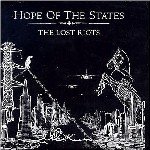
Hope of the States The Lost Riots
(Sony)
Without wanting to sound elitist, I was initially put off Hope Of The States by the major label involvement: so infrequently do majors get it right that my natural assumption was to steer clear. However, on recommendation I delved a little and came up with Black Dollar Bills, a debut single that rivalled any release last year; following this with the anthemic Enemies/Friends cemented my newly-formed opinion that the resultant album would be a treat.
And then came the tragic loss of guitarist Jimmi Lawrence earlier this year. A blow such as this would quite fairly have broken any band, but Hope Of The States decided to continue almost as a tribute to their friend, and The Lost Riots emerges as a fitting memorial, despite being completed before Lawrence's death.
From the outset, it is clear that this album is a triumph. Where it would be easy to dismiss the band as imitators or unoriginal, The Lost Riots cherry-picks the finest parts of Sigur Ros's post-rock, adds Doves' insistent rhythms and some politically charged yet optimistic lyrics, yet the band sound different in every way from these predecessors, and have crafted an album of great beauty, potential and emotional involvement.
Opening instrumental The Black Amnesias is a dynamic, triumphal beginning, with a real sense of a journey beginning. Taking in Mogwai's guitar blasts contrasted with delicately picked acoustics it sets the stall for the album.
It's followed by former single Enemies/Friends, a ray of hope and positivity in a relentlessly negative scene: "Come on people, keep your friends close, your enemies won't matter anymore." Don't Go To Pieces could easily be misconstrued as a cry to Lawrence, although written while he was still a member of the band, but lyrics like "don't you go to pieces now, I need you more than I ever did" have a remarkable poignancy about them now.
If the casual listener was to take away one thing from this album it would have to be the jarring juxtaposition of the latest and first singles as the centrepiece of the record. The Red, The White, The Black, The Blue is an abrasive clarion call, a structured, punky blast to wash away any vestiges of doubt as to the conviction of the band. Succeeding this is the aforementioned Black Dollar Bills, a sublimely atmospheric seven-minute epic, full of ridden cymbals, wailing feedback and monstrous dynamic shifts. The fadeout to this song alone is enough to reduce a grown man to awestruck wonderment, and every second is made to count.
Hope Of The States are one of those bands that are tricky to classify, where there's no such thing as a typical song: the bouncy, upbeat George Washington follows, with the elegiac Goodhorsehymn later on, and the world-weary yet forward-looking 1776 left to close the album in a haze of harps. Each song on The Lost Riots feels like it has a place, and the record therefore has a cohesion and coherence lacking on even the most grandiose projects of late.
A pedant would criticise Sam Herlihy's lead vocals as the weak point of this album, yet to do so would be to miss the point a little. While the sonic bliss of the band is the highlight of this album, the theme of the record is not one of perfection or contentment, rather of striving and reaching for more, of a call to change, or a cry of hope. Herlihy's strained pitching and cracked timbre actually offset the beauty of the music with a touch of reality and emotion, much like Thom Yorke's unnatural howl compliments Radiohead's angular delicacy.
2004 is turning into a good year for excellent debuts, and this album sets Hope Of The States well on the way to becoming major contenders in British music. Apparently, Sony slipped up on usual policy here: this is a stunning record.
24 June, 2004 - 23:00 — Simon Briercliffe